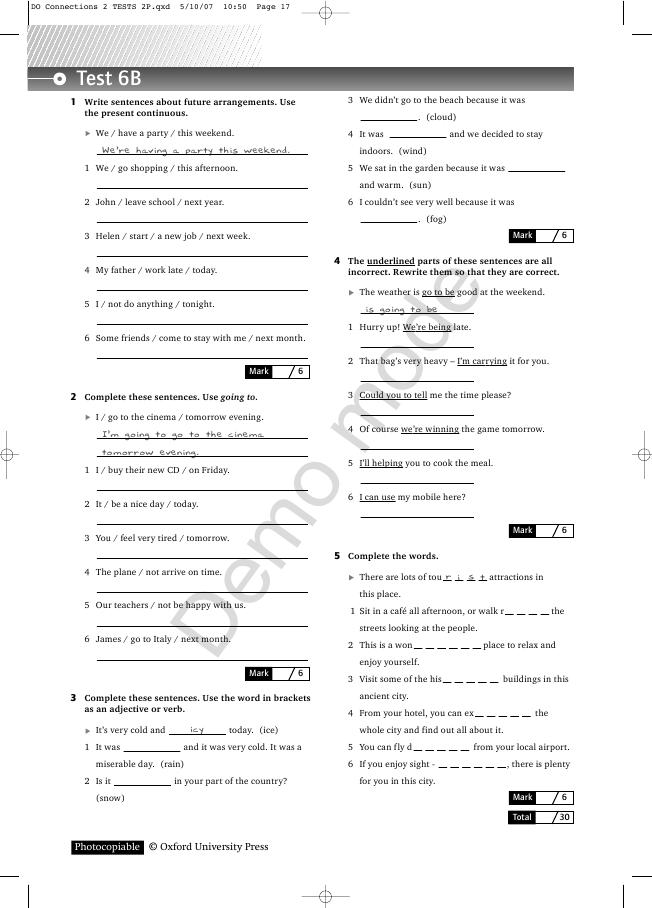Connections II Sprawdziany i Odpowiedzi�17

$
CO Connectlona 2 TES7S 2P.qx<S 5/10/07 10:50 Pago 17
Test 6B
1 Wrile sentences about futurę arrangeinents. Use the present continuous.
► We / have a party / this weekend.
tr ty t w »i *1 W~. r< J .
1 We / go shopping / this afternoon.
2 John / leave school / next year.
3 Helen / siait / a new job / next week.
4 My father / wortc late / today.
5 1 / not do anything/tonight.
6 Sonie friends / eonie to stay with nie / nexi month.
TE
2 Complete these sentences. Use golng to.
► 1 / go to the rinema / toinouow evening.
I rs 1 t o •«,:? t .-3 t i O*_ .v-.
1 1 / buy their new CD / on Friday.
2 U / be a nice day / today.
3 You / feel very tired / tomorrow.
4 The piane / not ari ive on time.
5 Oui teaeheis / not be happy with us.
6 James / go to Italy / next month.
ZE
3 Complete these sentences. Use the word in brackets as an adjective or verb.
» It’s very cold and <^-1 today. (ice)
1 lt was_and it was sety cold. It was a
misetable day. (rain)
2 ls ii_in your part of the country?
(snów)
3 We didnT go to the beach because it was __(cloud)
4 It was _and we decided to stay
indoots. (wind)
5 We sat in the garden because it was_
and warm. (sun)
6 I couldiTt see very well because it was
__(fos)
nazzu
4 The underlined parts of these sentences are all
Incorrect. Rewrlte them so that they are correct.
► The weather is go to be good at the weekend.
.oiw to be_
1 Hurry up! We re being late.
2 That bag's very heavy - 1’m earrying u for you.
3 Could you to tell me the time please?
4 Of course were wnining the gamę tomorrow.
5 TU heloing you to cook the meal.
6 1 can use my mobile here?
mzzii
5 Complete the words.
► There are lots of touji a_ _1_ attractions in this place.
1 Sit in a cafź all afternoon. or walk r____the
streets looking at the people.
2 This is a won______place to relax and
enjoy youtself.
3 Visit sonie of the his_____buildings in this
ancient city.
4 From your hotel, you can ex_____the
whole city and find out all about it.
5 You can fly d_____froni your loeal airport.
6 If you enjoy sight -______. there is plenty
for you in this city.
/ 6 |
Ł5SI j 30 |
Photocopiable
© Oxford University Press
Wyszukiwarka
Podobne podstrony:
Connections II Sprawdziany i Odpowiedzi�06 CO ConnccŁlona 2 TES7S 2P.qx<S 5/10/07 &
Connections II Sprawdziany i Odpowiedzi�08 CO ConnccŁlons 2 TES7S 2P.qx<S 5/10/07 &
Connections II Sprawdziany i Odpowiedzi�11 § CO eonncctlons 2 TES7S 2P.qx<S 5/10/07
Connections II Sprawdziany i Odpowiedzi�13 $ CO ConnccŁlona 2 TES7S 2P.qx<S 5/10/07
Connections II Sprawdziany i Odpowiedzi�16 $ CO ConnccŁlona 2 TES7S 2P.qx<S 5/10/07
Connections II Sprawdziany i Odpowiedzi�19 CO ConnccŁlons 2 TES7S 2P.qx<S 5/10/07 &
Connections II Sprawdziany i Odpowiedzi�25 CO ConnccŁlons 2 TES7S 2P.qx<S 5/10/07 &
Connections II Sprawdziany i Odpowiedzi�32 $ CO eonnectlons 2 TES7S 2P.qx<S 5/10/07
Connections II Sprawdziany i Odpowiedzi�35 $ CO ConnccŁlona 2 TES7S 2P.qx<S 5/10/07
Connections II Sprawdziany i Odpowiedzi�39 CO Conncctlons 2 TES7S 2P.gxd 5/10/07
Connections II Sprawdziany i Odpowiedzi�36 CO Conncctlona 2 VE37S 2P.qx<S 5/10/07 &
Connections II Sprawdziany i Odpowiedzi�27 CO ConnccŁlons 2 7E37S 2P.qxd 5/10/07
Connections II Sprawdziany i Odpowiedzi�10 JEO Conncctlona 2 TE37S 2P.qx<S 5/10/07
Connections II Sprawdziany i Odpowiedzi�34 JEO Conncctlona 2 TE37S 2P.qx<S 5/10/07
Connections II Sprawdziany i Odpowiedzi�04 CO Connectlcms 2 TES7S 2P.qx<S 5/10/07 &
Connections II Sprawdziany i Odpowiedzi�07 CO Connectlona 2 TES7S 2P.qx<S 5/10/07 &
Connections II Sprawdziany i Odpowiedzi�09 CO Connectlona 2 TES7S 2P.qx<S 5/10/07 &
Connections II Sprawdziany i Odpowiedzi�15 CO Connectlona 2 TES7S 2P.qx<S 5/10/07 &
więcej podobnych podstron